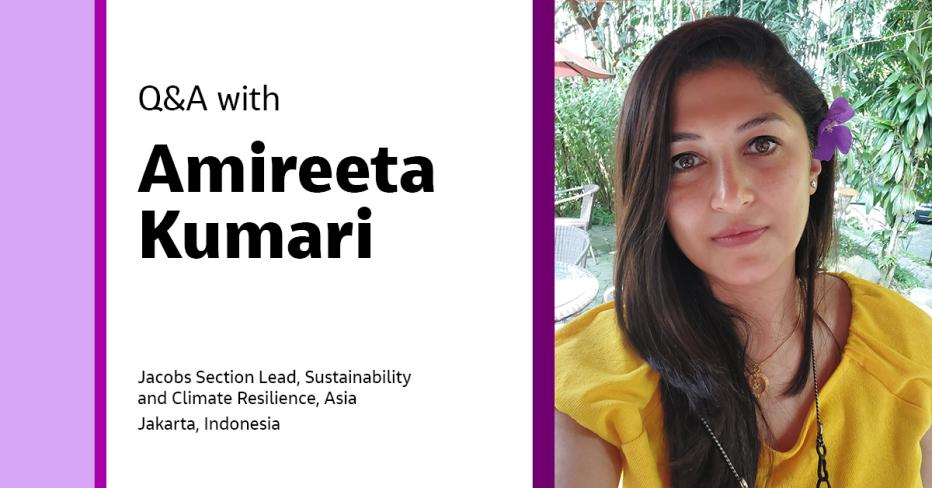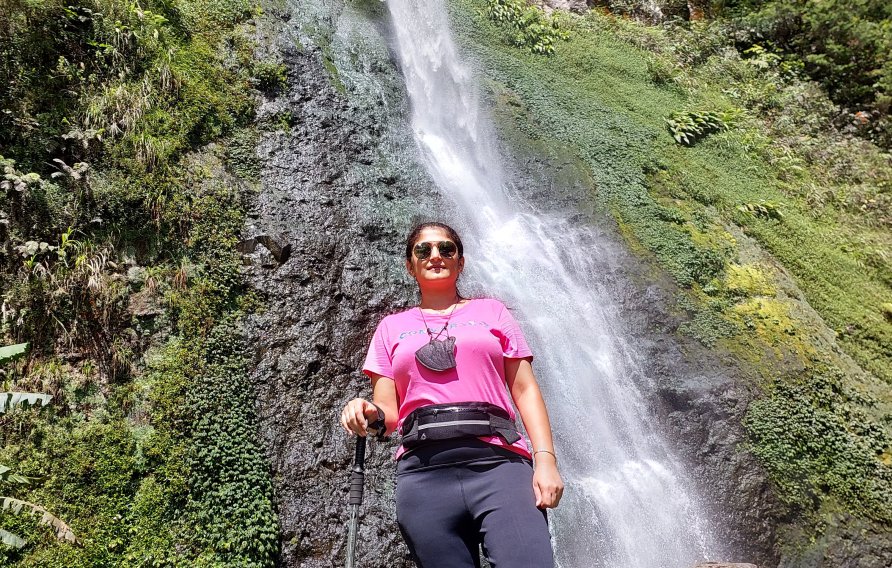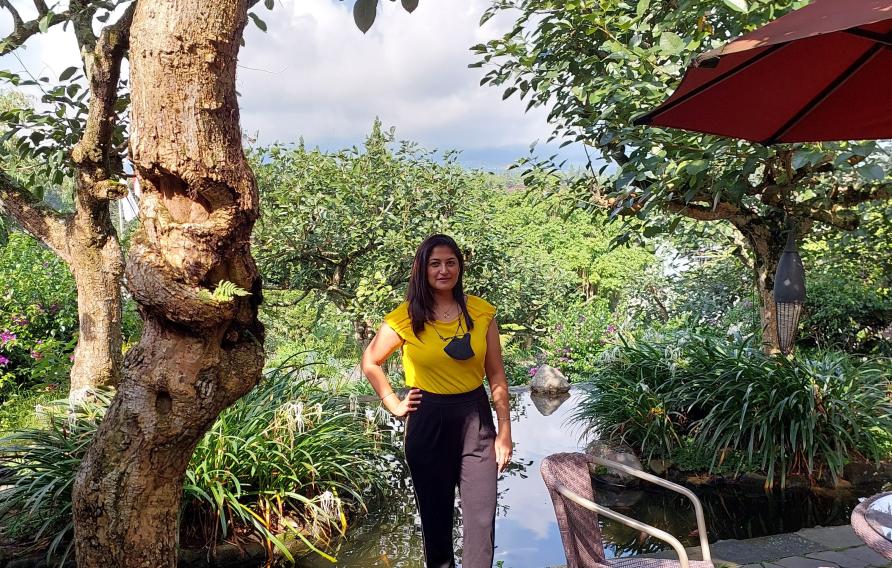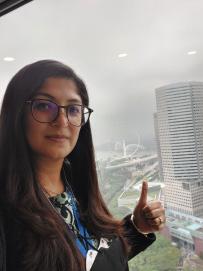



We sat down with Amireeta Kumari, our section lead for sustainability & climate resilience in Asia, to unpack decarbonization opportunities and pathways to a green future, drawing from her experience developing sustainability and climate response solutions for the region.

Let’s get started:
Firstly, tell us a bit about your role and what you love about your STEAM career.
I lead Jacobs’ Sustainability and Climate Response services in Asia and wear the dual hat of technical and operational lead, supporting our Director of Operations for Asia Environmental Solutions.
I work with our multidisciplinary team to advise clients across sectors on sustainability and climate action. This includes helping them integrate sustainability into their business operations and ensuring climate resilience throughout their asset lifecycle phases, such as design and planning, construction, operations and decommissioning.
My experience mostly entails working with the energy sector to support their transition to clean energy across their business portfolio. This includes traditional energy companies primarily relying on fossil fuels and clean energy providers using hydrogen, wind, solar, biogas, nuclear and geothermal.
Sustainability is a space that’s constantly evolving and requires continuous innovation. What I love about my career is the continuous learning that comes with helping clients transition to a low-carbon economy. This involves advising companies starting their environmental, social and governance (ESG) journey. We help them understand material priorities, define their baseline and support market leaders with innovative strategies and solutions, including managing supplier emissions and carbon offsets.
Besides supporting project delivery and business development and advancing Jacobs’ ESG and climate response capabilities in Asia, I’m involved in training our team in areas such as ESG assessment and due diligence, carbon inventory calculation, lifecycle analysis and embodied carbon assessment, climate risk assessment and Task Force on Climate-Related Financial Disclosures (TCFD) reporting.
What do you think are the biggest challenges facing global decarbonization efforts?
Our global decarbonization efforts face many challenges and every sector is faced with its own set of unique challenges.
Some common challenges include the urgency for action due to limited time in our fight against climate change; knowledge gaps in terms of technology and other solutions that can solve this problem such as clean energy technology options in different markets; financing decarbonization; regulations and policies to drive a standard effort globally; and global consumption that continues to drive the demand for carbon-intensive products and services.
Can you tell us a bit more about the decarbonization solutions and projects that address some of our market challenges?
Most of our sustainability and climate response services help our clients with their decarbonization journey. We advise clients across sectors, including infrastructure, energy and power, technology, life sciences and financial institutions, throughout their decarbonization cycle to meet their net zero targets.
This starts with carbon emissions assessment to understand emissions baseline and key sources, followed by developing a decarbonization/net zero strategy and targets and supporting its implementation, including achieving energy efficiency, transitioning toward renewable energy, implementing carbon offsets for hard-to-abate emissions through nature-based solutions or purchasing or creating carbon credits.
Our key differentiator in the market is our multidisciplinary consulting and engineering capability. We not only advise the strategy toward decarbonization but also support its implementation and monitoring.
Where do you think the greatest decarbonization opportunity lies and how can companies get started with their decarbonization journey?
Decarbonization is an integrated effort and requires collaboration and partnership between corporations, government agencies, financial institutions and academic and research institutions.
It would be ideal for companies and governments to transition to 100% low carbon energy . Practically, this transition may take time as companies are trying to understand pathways to decarbonization and find reliable solutions for the transition.
To begin the journey, they can consider easier options to reduce greenhouse emissions, such as implementing energy efficiency measures, using renewable energy sources and clean technology solutions, where possible, for their own operations.
Managing supply chain (Scope 3) emissions through measures such as sourcing sustainable and green raw materials is another opportunity. For hard-to-abate emissions, implementing nature-based solutions, such as forestation and blue carbon projects to sequester carbon emissions, is another potential opportunity to consider and is getting regional interest. Finally, innovation in business processes and operations, such as zero-carbon products and services, is another opportunity.


People would be surprised to know that ….
I have six goldfish pets!
I’m a scuba diver and love to spend time in nature.
What’s something you learned in the last week?
Plenty of things. Each project and client is a learning opportunity for me.
Proudest career moment?
Hard to pick one…I’m simply proud of my career journey as a Sustainability and Climate Change Consultant.
“The corporate sector has a major role to play in our global fight against climate change. As a specialist consultant advising private sector clients and governments on decarbonization and climate action, I feel proud to play a role in combating climate change.”
When you’re not at work, you enjoy…
Spending time reading, surfing the internet and hanging out with my husband and family.
What do you enjoy most about being part of #OurJacobs?
The global working culture at Jacobs is the most exciting part for me.
We are a global consulting firm in a true sense. For instance, when working on any project, I’m not restrained by regional boundaries and get to work with and engage our talented global experts and consultants. This also lets me contribute to our global projects and opportunities outside of Asia Pacific.
I truly believe in our One Jacobs approach.

Amireeta Kumari started as a marketing executive in Singapore but soon got interested in environmental protection and conservation. That's when she decided to pursue a master’s degree in environmental management at the National University of Singapore in 2010.
Over the past 15 years, she has worked as a management consultant specializing in sustainability and climate resilience in Asia Pacific, Middle East and Africa. She recently completed an executive master’s course from the Duke University in the U.S., another degree focused on environmental leadership.
Some of her publications include: